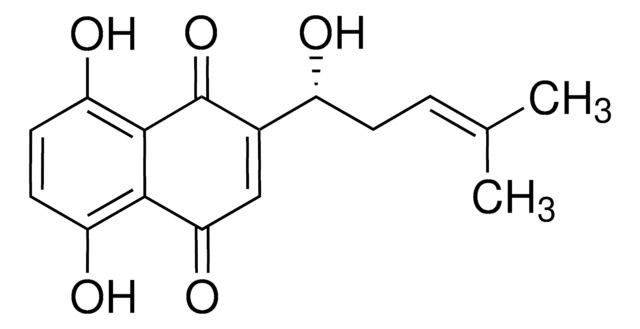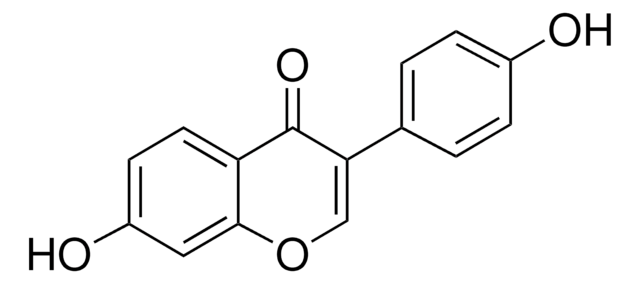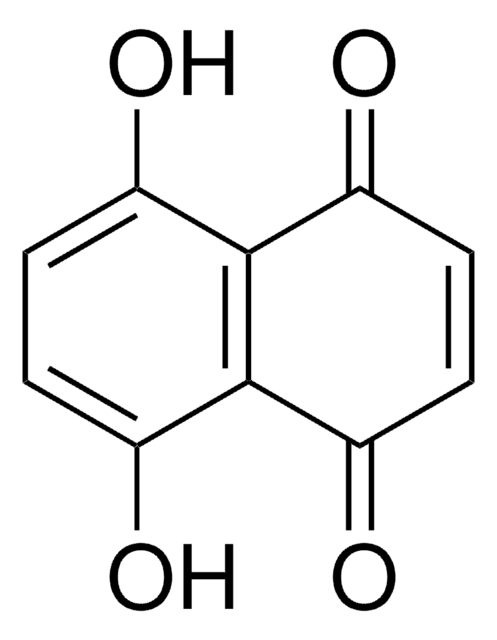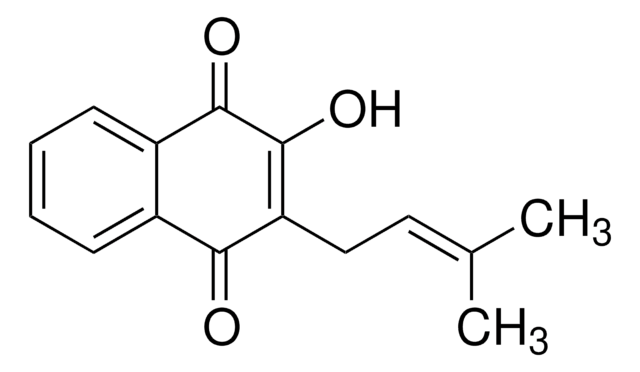S7576
Shikonin
≥98% (HPLC)
Sinónimos:
(±)-5,8-Dihydroxy-2-(1-hydroxy-4-methyl-3-pentenyl)-1,4-naphthoquinone, (±)-Alkannin, (±)-Shikalkin, (±)-Shikonin
About This Item
Productos recomendados
Quality Level
assay
≥98% (HPLC)
form
powder or solid
color
red to brown
solubility
methanol: 1 mg/mL
application(s)
metabolomics
vitamins, nutraceuticals, and natural products
storage temp.
2-8°C
SMILES string
C\C(C)=C\CC(O)C1=CC(=O)c2c(O)ccc(O)c2C1=O
InChI
1S/C16H16O5/c1-8(2)3-4-10(17)9-7-13(20)14-11(18)5-6-12(19)15(14)16(9)21/h3,5-7,10,17-19H,4H2,1-2H3
InChI key
NEZONWMXZKDMKF-UHFFFAOYSA-N
Categorías relacionadas
General description
Application
- to enhance the anti-tumor activity of gefitinib on tyrosine kinase receptor epidermal growth factor receptor (EGFR) in wild-type lung cancer cells
- as an inhibitor of renal aerobic glycosis and a potential
- as an anti-inflammatory agent to test its role to improve lipopolysaccharide (LPS)-induced cardiac dysfunction
- to stimulate bone marrow-derived macrophages (BMDMs) to test the effect of Interferon regulatory factor 1 on cell death
Biochem/physiol Actions
signalword
Warning
hcodes
Hazard Classifications
Acute Tox. 4 Oral - Aquatic Acute 1
Storage Class
11 - Combustible Solids
wgk_germany
WGK 3
flash_point_f
Not applicable
flash_point_c
Not applicable
Certificados de análisis (COA)
Busque Certificados de análisis (COA) introduciendo el número de lote del producto. Los números de lote se encuentran en la etiqueta del producto después de las palabras «Lot» o «Batch»
¿Ya tiene este producto?
Encuentre la documentación para los productos que ha comprado recientemente en la Biblioteca de documentos.
Los clientes también vieron
Nuestro equipo de científicos tiene experiencia en todas las áreas de investigación: Ciencias de la vida, Ciencia de los materiales, Síntesis química, Cromatografía, Analítica y muchas otras.
Póngase en contacto con el Servicio técnico














